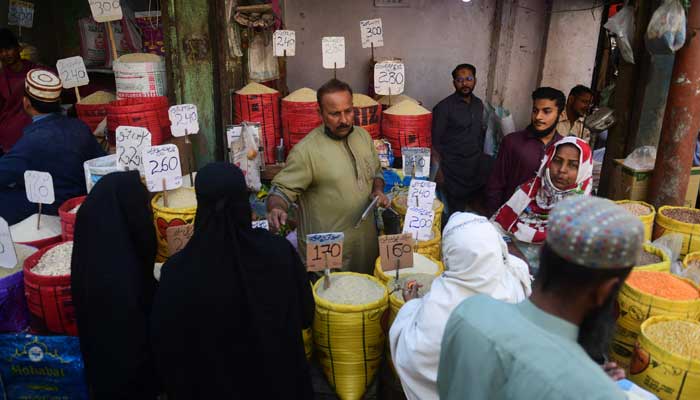Weekly inflation surges by 2.78pc
Consumers last saw SPI surge 42.7% year-on-year five months back when wheat flour prices reached all-time amid flooding
KARACHI: Pakistan’s weekly inflation remained stubbornly elevated at 2.78 percent week-on-week and 41.54 percent year-on-year during the seven-day period ended February 23, as government raised gas tariff to please the International Monetary Fund (IMF).
Pakistan Bureau of Statistics (PBS) data issued on Friday attributed the rise in the sensitive price indicator (SPI) inflation to WoW increase in prices of gas for Q1 (108.38 percent), cigarettes (76.45 percent), bananas (6.67 percent), chicken (5.27 percent), sugar (3.37 percent), cooking oil 5 litre (3.07 percent), vegetable ghee 2.5kg (2.79 percent), vegetable ghee 1kg (2.20 percent) and prepared tea (1.09 percent).
To get IMF approval for the $1.1 billion tranche out of the $6.5 billion bailout package under the extended fund facility, the government of Pakistan almost doubled the gas charges for up to 3.3719 MMBTU. Previously, the rate was Rs147.57, which now stands at Rs295.
Consumers last saw SPI surge 42.7 percent YoY during the week ended September 8, 2022 when wheat flour prices reached an all-time high on account of massive flooding across the country.
PBS attributed the YoY increase in SPI to the rise in prices of onions (372.03 percent), cigarettes (164.71 percent), gas charges for Q1 (108.38 percent), chicken (85.65 percent), diesel (81.36 percent), eggs (75.81 percent), rice irri-6/9 (75.41 percent), rice basmati broken (74.16 percent), bananas (72.22 percent), pulse moong (70.39 percent), petrol (69.87 percent), tea (62.76 percent), pulse gram (57.02 percent), bread (55.36 percent), pulse mash (53.90 percent) and LPG (52.59 percent).
However, it also noted a decrease in the prices of tomatoes (67.93 percent), chili powder (7.42 percent) and electricity charges for Q1 (6.64 percent).
The stubborn rise in SPI inflation was expected.
Analysts had said last week that inflationary pressures would intensify as the government has taken tax measures and made electricity, petroleum and gas price adjustments to unlock the IMF programme.
Consumers have been reeling under the burden of rising prices of essential kitchen items, particularly edibles.
As per PBS data, the average price of 1kg broiler chicken was Rs469.81 during the week under review compared to Rs446.29 last week. Up only Rs23.52/kg. However, consumers had something else to say.
A woman buying chicken from a shop in Karachi said, “They are selling chicken for gold now. I just bought half a kilo of chicken wings for Rs400.”
A kebab shop owner standing nearby said that it was becoming impossible to do business as boneless chicken was above Rs1,000/kg. “Like others, I should either reduce the quality of the kebabs or start charging higher. But if I increase the price, my sales will be hit as people are already cutting their expenses,” he added.
For the groups spending up to Rs17,732; Rs17,733-22,888; Rs22,889-29,517; Rs29,518-44,175; and above Rs44,175; WoW SPI increased 2.42, 2.86, 2.32, 2.18, and 3.10 percent respectively.
On the other hand, YoY SPI for the expenditure groups went up 37.81, 39.80, 40.95, 41.94, and 42.98 percent respectively.
For the week under review, SPI was recorded at 241.29 points against 234.77 points registered last week and 170.47 points recorded during the week ended February 24, 2022.
-
 Winter Olympics 2026: When & Where To Watch The Iconic Ice Dance ?
Winter Olympics 2026: When & Where To Watch The Iconic Ice Dance ? -
 Melissa Joan Hart Reflects On Social Challenges As A Child Actor
Melissa Joan Hart Reflects On Social Challenges As A Child Actor -
 'Gossip Girl' Star Reveals Why She'll Never Return To Acting
'Gossip Girl' Star Reveals Why She'll Never Return To Acting -
 Chicago Child, 8, Dead After 'months Of Abuse, Starvation', Two Arrested
Chicago Child, 8, Dead After 'months Of Abuse, Starvation', Two Arrested -
 Travis Kelce's True Feelings About Taylor Swift's Pal Ryan Reynolds Revealed
Travis Kelce's True Feelings About Taylor Swift's Pal Ryan Reynolds Revealed -
 Michael Keaton Recalls Working With Catherine O'Hara In 'Beetlejuice'
Michael Keaton Recalls Working With Catherine O'Hara In 'Beetlejuice' -
 King Charles, Princess Anne, Prince Edward Still Shield Andrew From Police
King Charles, Princess Anne, Prince Edward Still Shield Andrew From Police -
 Anthropic Targets OpenAI Ads With New Claude Homepage Messaging
Anthropic Targets OpenAI Ads With New Claude Homepage Messaging -
 US Set To Block Chinese Software From Smart And Connected Cars
US Set To Block Chinese Software From Smart And Connected Cars -
 Carmen Electra Says THIS Taught Her Romance
Carmen Electra Says THIS Taught Her Romance -
 Leonardo DiCaprio's Co-star Reflects On His Viral Moment At Golden Globes
Leonardo DiCaprio's Co-star Reflects On His Viral Moment At Golden Globes -
 SpaceX Pivots From Mars Plans To Prioritize 2027 Moon Landing
SpaceX Pivots From Mars Plans To Prioritize 2027 Moon Landing -
 J. Cole Brings Back Old-school CD Sales For 'The Fall-Off' Release
J. Cole Brings Back Old-school CD Sales For 'The Fall-Off' Release -
 King Charles Still Cares About Meghan Markle
King Charles Still Cares About Meghan Markle -
 GTA 6 Built By Hand, Street By Street, Rockstar Confirms Ahead Of Launch
GTA 6 Built By Hand, Street By Street, Rockstar Confirms Ahead Of Launch -
 Funeral Home Owner Sentenced To 40 Years For Selling Corpses, Faking Ashes
Funeral Home Owner Sentenced To 40 Years For Selling Corpses, Faking Ashes




